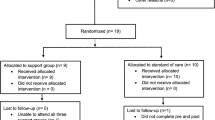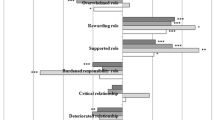Abstract
Urinary incontinence can be expected to present an issue in domestic care with various conditions and ways of dealing with the situation. This pilot study investigates the kinds of coping strategies developed by family caregivers of urinary incontinent persons. Therefore, it seeks to explore how family caregivers experience and shape everyday life with an incontinent family member.
Based on a qualitative design, problem-centered interviews were carried out with 10 family caregivers (4 men, 6 women) and analyzed according to Grounded Theory.
The results show that family caregivers place major emphasis on maintaining continence, which is conceived as an expression of concern for the care-dependent person. The data facilitated the development of four major concepts: incontinence as a cause of dependency, feelings of shame, striving for continence and coping with incontinence. These concepts indicate that family caregivers look for strategies to provide the incontinent family member with the opportunity of (self-) controlled excretion. Yet this kind of support is linked to feelings of shame on both parts.
Zusammenfassung
Da die Prävalenz der Harninkontinenz mit fortschreitendem Alter und zunehmender Pflegebedürftigkeit zunimmt, ist davon auszugehen dass Harninkontinenz ein Thema in der häuslichen Pflege darstellt, welches zu besonderen Bedingungen und diversen Gestaltungsmöglichkeiten führen kann. Diese Pilotstudie hat zum Ziel, Bewältigungsstrategien von pflegenden Angehörigen, die ein harninkontinentes Familienmitglied pflegen, zu untersuchen. Es wird der Frage nachgegangen, wie pflegende Angehörige den Alltag mit einem harninkontinenten Familienmitglied erleben und gestalten.
Basierend auf einem qualitativen Design, wurden mit 10 deutschen pflegenden Angehörigen (4 Männer, 6 Frauen) problemzentrierte Interviews geführt und diese in Anlehnung an die Methode der Grounded Theory ausgewertet.
In den Ergebnissen dieser Studie zeigt sich, dass im Zuge abnehmender körperlicher und geistiger Leistungsfähigkeit pflegebedürftiger Familienmitglieder die pflegenden Angehörigen dem Erhalt der Kontinenz, als Ausdruck der Sorge um den Pflegebedürftigen, eine bedeutende Rolle zuschreiben. Aus den Daten entwickelten sich vier Schwerpunktkonzepte: Inkontinenz als Zeichen zunehmender Pflegebedürftigkeit, Schamgefühl, Streben nach Kontinenz und Bewältigung von Inkontinenz. Diese zeigen dass pflegende Angehörige Strategien suchen, um ihren inkontinenten Familienmitgliedern die Möglichkeit zu geben, ihre Ausscheidungen kontrolliert verrichten zu können. Erkennbar ist, dass diese Hilfe für beide Seiten mit Scham verbunden sein kann und dass die Hilfen am Tag und in der Nacht nicht die gleiche Intensität aufweisen können.
Similar content being viewed by others
References
Aggazzotti G, Pesce F, Grassi D, Fantuzzi G, Righi E, De Vita D, Santacroce S, Artibani W (2000) Prevalence of urinary incontinence among institutionalized patients: a cross-sectional epidemiologic study in a midsized city in northern Italy. Urology 56(2):245–249
Ashworth PD, Hagan MT (1993) The meaning of incontinence: a qualitative study of nongeriatric urinary incontinence suffers. J Advanced Nursing 18(9):1415–1423
Cassells C, Watt E (2003) The impact of continence on older spousal caregivers. J Advanced Nursing 42(6):607–616
Dowd TT (1991) Discovering older women’s experience of urinary incontinence. Research in Nursing & Health, 14(3):179–186
Flick U (2002) Qualitative Sozialforschung – Eine Einführung (Qualitative research – An introduction). Rowohlt, Hamburg
Gallagher M, Pierce LP (2002) Caregivers’ and care recipients’ perceptions of dealing with urinary incontinence. Rehabilitation Nursing 27(1):25–31
Horn A (2002) Man wächst da einfach rein (Growing in to the situation). In: Schnepp W (ed) Angehörige pflegen. Huber, Bern
Hunskaar S, Burgio K, Diokno AC, Herzog AR, Hjälmas K, Lapitan MC (2002) Epidemiology and natural history of urinary incontinence in women. In: Abrams P, Cardozo L, Khoury S, Wein A (eds) Incontinence. 2nd International Consultation on Incontinence Paris, July 1–3. 2nd Edition 2002. Health Publication, Plymouth, UK, pp 167–201
Hunskaar S, Burgio K, Diokno A, Herzog AR, Hjälmas K, Lapitan MC (2003) Epidemiology and natural history of urinary incontinence in women. Urology 62(Suppl 4A):16–23
Landi F, Cesari M, Russo A, Onder G, Lattanzio F, Bernabei R (2003) Potentially reversible risk factors and urinary incontinence in frail older people living in community. Age and ageing 32(2):194–199
Mason L, Glenn S, Walton I, Appleton C (1999) The experience of stress incontinence after childbirth. Birth 26(3):164–171
Noelker L (1987) Incontinence in elderly cared for by family. Gerontologist 27(2):194–200
Ouslander JG, Zarit SH, Orr NK, Muira SA (1990) Incontinence among elderly community-dwelling dementia patients. Journal of American Geriatric Society 38(4):440–445
Schnepp W (2001) Familiale Sorge in der Gruppe der russlanddeutschen Spätaussiedler – Funktion und Gestaltung (Family care giving in the group of Russo-German resettles – function and formgiving). Proefschrift Universität Utrecht, pp 8–9, 119–154
Steffens MC, Bergler R (1995) Die Situation Angehöriger bei der häuslichen Pflege (The situation of relatives in the home care setting). Zentralblatt für Hygiene und Umweltmedizin 196:75–94
Stenzelius K, Mattiasson A, Hallberg IR, Westergren A (2004) Symptoms of urinary and feacal incontinence among men and women 75+ in relations to health complaints and quality of life. Neurourology and Urodynamics 23(3):211–222
Strauss A, Corbin J (1996) Grounded Theory – Grundlagen qualitativer Forschung (Grounded Theory – Basics). Psychologie Verlags Union, Weinheim
Thomas P, Ingrand P, Lallone F, Hazif- Thomas C, Billon R, Viébau F, Clément JP (2004) Reasons of informal caregivers for institutionalizing dementia patients previously living at home: the Pixel study. International journal of geriatric psychiatry 19(2):127–135
Thomas AM, Morse JM (1991) Managing urinary incontinence with self-care practices. J Gerontological Nursing 17:9–14
Witzel A (2000) Das problemzentrierte Interview (The Problem-centred interview). Forum Qualitative Sozialforschung (Forum: Qualitative Social Research). http://www.qualitative-research.net/ fqs-texte/1-00/1-00wit zel-d.htm (Date: 18. 8. 2005)
Witzel A (1989) Das problemzentrierte Interview (The Problem-centred interview). In: Jüttemann G (Hrsg) Qualitative Forschung in der Psychologie. Asanger, Heidelberg, pp 227–255
Zarit SH, Todd PA, Zarit JM (1986) Subjective burden of husbands and wives as caregivers: a longitudinal study. The Gerontologist 26(3):260–266
Author information
Authors and Affiliations
Corresponding author
Rights and permissions
About this article
Cite this article
Hayder, D., Schnepp, W. Urinary incontinence – The family caregivers’ perspective. Z Gerontol Geriat 41, 261–266 (2008). https://doi.org/10.1007/s00391-008-0560-9
Received:
Accepted:
Published:
Issue Date:
DOI: https://doi.org/10.1007/s00391-008-0560-9




